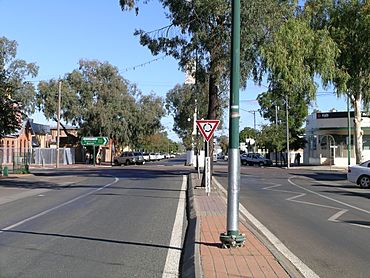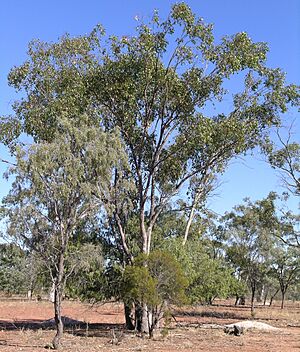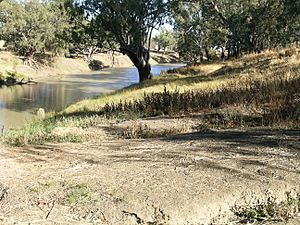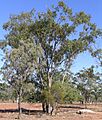Walgett, New South Wales facts for kids
Quick facts for kids WalgettNew South Wales |
|||||||||
|---|---|---|---|---|---|---|---|---|---|

Main street, Walgett (Fox Street/Castlereagh Highway) looking south over Wee Waa Street
|
|||||||||
| Population | 2,145 (2016 census) | ||||||||
| Postcode(s) | 2832 | ||||||||
| Elevation | 133 m (436 ft) | ||||||||
| Location |
|
||||||||
| LGA(s) | Walgett Shire | ||||||||
| County | Baradine | ||||||||
| State electorate(s) | Barwon | ||||||||
| Federal Division(s) | Parkes | ||||||||
|
|||||||||


Walgett is a town in northern New South Wales, Australia. It is the main town for the Walgett Shire area. Walgett is located where the Barwon and Namoi Rivers meet. It is also at the crossing of the Kamilaroi and Castlereagh Highways. In 2016, Walgett had a population of 2,145 people.
The name Walgett comes from an Aboriginal word. It means 'the meeting place of two rivers'. In the Walgett Local Government Area, about 29.4% of people are Aboriginal and/or Torres Strait Islander.
Contents
History of Walgett
The land around Walgett was originally home to the Gamilaroi (also known as Kamilaroi) nation. They are an Indigenous Australian people.
Aboriginal Languages in the Area
The Yuwaalayaay language is spoken in this region. It is an Australian Aboriginal language. It is similar to the Gamilaraay and Yuwaalaraay languages. The Yuwaalayaay language area includes places like Dirranbandi, Goodooga, Walgett, and the Narran Lakes.
Early European Settlement
A post office was set up in Walgett in 1851. The town's layout was planned in 1859. Before this, farmers and their animals would have lived in the area. The town of Walgett was officially declared on March 20, 1885. A surveyor named Arthur Dewhurst mapped the town. He named some streets after British Prime Ministers. The Walgett Courthouse was built in 1865.
River Trade and Inventions
In the late 1800s, Walgett was a busy port. Paddle steamers used to travel along the Murray-Darling river system to the town. The first steamer arrived in Walgett in 1861. They visited regularly until about 1870.
Euroka Station is a property near Walgett. In 1876, Fred Wolseley bought it. He invented the Wolseley Shearing Machine there. This machine changed the sheep shearing industry. It was tested in 1888 on 184,000 sheep.
The Freedom Rides
Walgett was part of the Freedom Rides in the mid-1960s. These rides were protests against unfair treatment. On February 15, 1965, students from Sydney University arrived in Walgett. Charles Perkins was one of them.
They protested outside the Walgett RSL Club. They said the club was not letting Indigenous ex-servicemen join. They also protested at a dress shop. The shop owner would not let Indigenous women try on dresses. After their protests, the students left town. This event brought a lot of attention to Walgett and the issues faced by Indigenous Australians.
Population of Walgett
The population of Walgett has changed over the years.
- In 1954, there were 1,348 people.
- In 1971, the population reached 2,284.
- By 2016, the population was 1,546.
- In 2021, it was 1,377.
According to the 2016 census, there were 2,145 people in Walgett.
- About 43.4% of the people were Aboriginal and Torres Strait Islander.
- Most people (81.0%) were born in Australia.
- About 84.3% of people spoke only English at home.
- The most common religions were Anglican (31.4%), Catholic (26.7%), and No Religion (19.9%).
Walgett's Climate
Walgett has a hot, semi-arid climate. This means it has very hot summers and mild to cool winters. Sometimes there are frosts in winter. Summer temperatures often go above 40 degrees Celsius. The highest temperature ever recorded was 49.2 degrees Celsius in January 1903. This is one of the hottest temperatures recorded in New South Wales.
The town gets about 439.0 mm of rain each year. Rain falls fairly evenly throughout the year. However, summer rain often comes as heavy but short thunderstorms. Winter rain is usually very light.
Drought Conditions
In December 2018, during a drought, the Barwon River at Walgett stopped flowing. It became a series of still pools. The town used bore water from the Great Artesian Basin. There were concerns about the quality of this water for drinking.
Economy and Industries
Walgett is an important center for several industries. These include wool, wheat, and cotton farming. It is also known as the gateway to the New South Wales opal fields. These are located at Lightning Ridge to the north and The Grawin to the west. Wheat is the main crop grown in the area. However, during droughts, farmers grow more lucerne and other hay crops.
Sports and Recreation
Walgett has a strong rugby league culture. The town's rugby league ground is named after Ricky Walford. He is a former St. George Dragons player who played for Walgett as a junior. Walgett is home to the Walgett Dragons and Newtown Wanderers rugby league clubs. They both play in the Barwon Darling Rugby League. The Dragons have won several championships.
The Walgett Rams are the local rugby union team. They play in the Western Plains Rugby Union competition.
Cricket is the main summer sport. Local teams from Walgett, Cumborah, Lightning Ridge, Collarenebri, and Goodooga play against each other.
The Walgett and District Sporting Club offers facilities for tennis, golf, and lawn bowls. The golf course has sand and oil greens instead of grass.
Football Carnivals
The local college hosts two big football events each year. The Ricky Walford Shield and the Neville Thorne Shield are rugby league competitions. They are held in August for primary and high school students.
Walgett Aero Club
The Walgett Aero Club was started in 1958. It has a clubhouse and hangar at the airport. The club bought its first two planes, DH-82 Tiger Moths, in its early years. The club has grown and now has modern aircraft like Cessna and Piper planes. In 2008, the club celebrated its 50th anniversary. It is still an active part of the area's transport and aviation.
Education in Walgett
In 2003, the pre-school, primary school, and high school in Walgett were combined. They became the Walgett Community College. This college is a special place for learning. It created the successful Yaama Maliyaa group. This group won national awards in Young Achievers Australia in 2005.
Media in Walgett
Walgett has a weekly newspaper called the Walgett Spectator. It has been published continuously since the 1800s. Even after a fire destroyed its office in 1903, it kept going. Outback Radio 2WEB also broadcasts in the area on 104.3FM.
Notable People from Walgett
Images for kids
-
Trees that are common in the Walgett district: Eucalyptus (bimble box), Geijera (wilga), sandalwood and Acacia (ironwood)
-
Barwon River near Walgett
See also
 In Spanish: Walgett para niños
In Spanish: Walgett para niños





